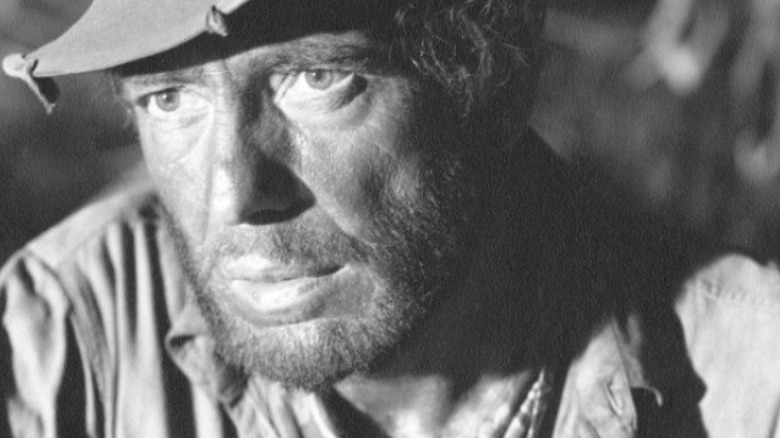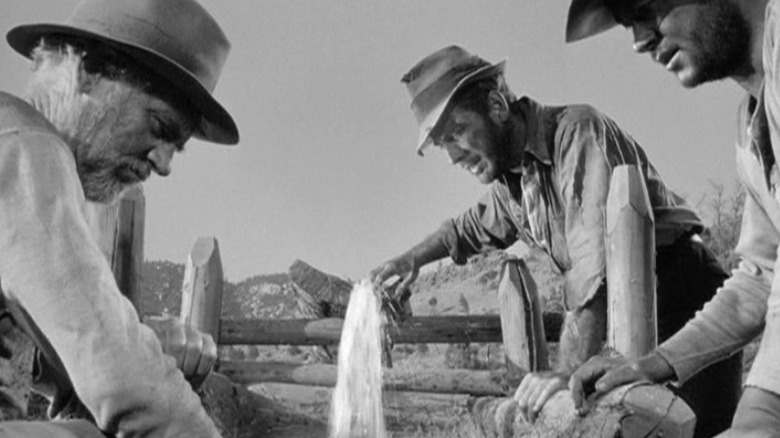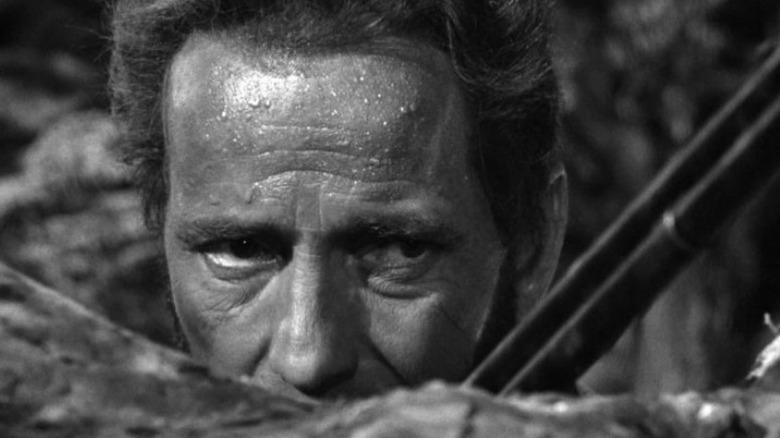Treasure Of The Sierra Madre Ending Explained: Can Gold Change A Man's Soul?
Humphrey Bogart was looking for the chance to play a villain again. By 1946, he'd fully moved on from the supporting roles in gangster movies on which his career had been built, and into stardom, with "Casablanca" as a major turning point. As a major box office draw, he could choose anything to focus on next.
When he found out his old collaborator John Huston (who would eventually get Bogart an Oscar with a moment that was a little too real in "The African Queen") was following his wartime documentaries with an adaptation of the grim fable "Treasure of the Sierra Madre," Bogart made moves to get cast, and it became one of his best movies. While preparing for "Treasure," he gleefully told a New York Post critic how excited he was to play "the worst s*** you ever saw," according to "Bogart" by A.M. Sperber and Eric Lax.
Huston had actually sought out the rights to the book in 1941, following the completion of his directorial debut (with Bogart), "The Maltese Falcon." His agent, Paul Kohner, attempted to make inroads with the book's mysterious author, the elusive B. Traven. All anybody knew about Traven (one pseudonym of many for a German Communist in Mexican exile) was that nobody knew anything. When studios first reached out to him about adapting his novels, he claimed he would only sell the rights to "non-capitalist countries." Looking at "Treasure," particularly the arc of its protagonist, the theme of wealth as poison is inescapable.
The risky role
Huston thought of Bogart as a "high-flying gambler" and a risk-taker for embracing the role, and few things were riskier than the opening of "Treasure of the Sierra Madre," which lingers on the poverty and bitterness of its lead. Fred C. Dobbs (Bogart) begins the film as a man out of luck on the streets of Tampico, Mexico. He begs for change through gritted teeth. By emphasizing Dobbs' circumstances, the movie draws all the sympathy that it can before he begins his loathsome scheming.
Soon, he meets fellow vagrant Curtin (Tim Holt), a good-natured laborer with whom he hits it off, the two bonding over shared feelings of exploitation by their boss, who failed to make good on their proposed payments.
The two meet a fast-talking older prospector named Howard (Walter Huston, John's father), whose rambling spoils the movie's plot by talking about how murder is never far away if you have a partner, and how "gold changes a man's soul." As played by Huston, Howard is charming and convincing; he is a man who's seen things. And he inspires Dobbs and Curtin to take him along as they dig for gold.
Gold in them there hills
The trio ends up in the Sierra Madre mountains, stuck in the heat without a guide. Dobbs and Curtin grow quickly hopeless, but Howard is spry and observant, bounding across mountains with the vigor of a younger man. Here, John Huston's insistence on shooting on location in Mexico comes in handy; the beauty and punishing heat of the mountains mixed with the physical distance the actors need to cross creates a sense of exertion and exhaustion.
Howard eventually spots gold, and does a prospector dance to commemorate it. But high danger is never far from the trio. The work is hard and life-threatening, and over campfire conversations it becomes clear that there are trust issues among the group, mostly from Dobbs. The tension grows when a Texan named Cody (Bruce Bennett) has found them out, and wants a share. One of the movie's many fraught moral discussions comes from whether or not they should kill him.
Luckily for them, they don't have to decide. Bandits find them out, pretending to be federales, and when their leader Gold Hat (Alfonso Bedoya) is asked for badges, he replies simply that "they don't need badges," another of the movie's iconic lines. Cody gets killed in the crossfire.
Laughter over sandstorms
As Howard briefly departs the group to help take care of a sick village boy, Dobbs becomes convinced his original partner is going to kill him and steal all the gold. His only solution is to do it first. From that moment on, the two keep their guns on them at all times.
The next night, Dobbs wakes up Curtin and holds a gun on his former friend. Curtin is tossed to the ground. All we hear is a gunshot. One of Bogart's most remarkable moments as an actor follows, as he covers up the tracks of his murder, wrestling with guilt and responsibility and elation in having the money, soliloquizes, "conscience ... what a thing."
But Curtin survives the shot, and reunites with Howard. Dobbs flees the crime scene, but ends up the victim of Gold Hat and his men, who kill him, steal his burros, and mistake the bags of gold for bags of sand, dumping them on the ground. When his two former partners catch up and discover that their gold has been lost to a desert sandstorm, all they can do is laugh at the bitter irony.
The overwhelming bleakness of "Treasure of the Sierra Madre," its harsh moral outlook, and its pathetic protagonist made for a tough sell and a low initial box office. But like the gold in the final scene of the movie, that drama's faded away by now, leaving in its wake a classic of paranoia and greed.



